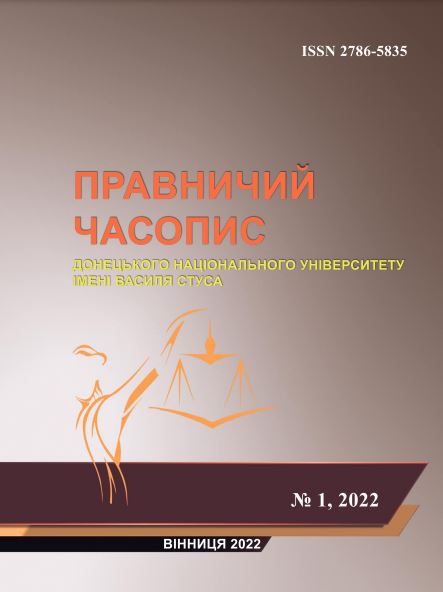Doctrine Formation of Freedomo of Movement as a Natural Human Right
DOI:
https://doi.org/10.31558/2786-5835.2022.1.2Keywords:
freedom; freedom of movement; doctrine; human right; natural lawAbstract
The article examines the question of the formation and development of certain elements of the content of the right to freedom of movement in the legal doctrines of different historical periods. The author analyzes various factors that were characteristic for the development of the content of this right (social status, citizenship, trade, wars, human nature).
The author concludes that in antiquity there was an understanding of freedom of movement as a natural law, as a component of human essence. Movement within the policy is not enough to exercise the right to freedom of movement, there must be the right to leave. Citizens of the Greek polis could move freely traveled, as a result of which there was a mixture of peoples. According to H. Grotius the doctrine of the right to freedom of movement begins with its absolute recognition and promotion and only after such a presumption can reasonable restrictions begin. Grotius forms such a position for purely pragmatic reasons in order to enable the Dutch fleet to travel freely to other lands.
The article analyzes the position of Francisco de Vitoria, who emphasized that anyone should be allowed to go on a journey and travel anywhere justified the Spaniards’ travels to the New World believed that these lands should not be populated by force, they have the right to carry Christianity, however only if the Indians resist then there is a right to war. From the position of Emmerich de Vattel follows the proposition that it is natural right, innate freedom its recognition gives grounds for the first time to talk about personal motives for moving and changing one’s place of residence before this one could see only reasons of either profession (in particular trade) or status (free or not free). If a person cannot find himself or achieve the desired well-being he has a natural right to freedom of movement.
According to Rousseau the right to emigration as a component of freedom of movement is quite permissible as a recognition of it as natural and it is limited only to obligations to the state of a predominantly military nature which brings it closer to modern interpretations of this right.
References
Jane Mcadam. An Intellectual History of Freedom of Movement in International Law: the Right to Leave as a Personal Liberty. Melbourne J. of Int’l Law 27. June, 2011.
Платон. Критон. Платон. Діалоги пер. з давньогр. Й. Кобів, У. Головач, Дз. Коваль, Т. Лучук, Ю. Мушак. Київ: Основи, 1999. С. 44–52.
Epictetus. A Selection from the Discourses of Epictetus with the Encheiridion. CreateSpace Independent Publishing Platform (November 1, 2012). 128.
Hugo Grotius. The Freedom of the Seas (Ralph van Deman Magoffin trans, Oxford University Press, 1916). URL: https://oll.libertyfund.org/title/scott-the-freedom-of-the-seas-latin-and-english-version-magoffin-trans
Hugo Grotius. On the Law of War and Peace (Francis W Kelsey trans, Clarendon Press, 1925). Vol. 2, 196.
Francisco de Vitoria, On the Indians Lately Discovered (John Pawley Bate trans, Lawbook Exchange, 2000). Sect. III, 386, trans of: De Indis Noviter Inventis.
Emer de Vattel. The Law of Nations, or, Principles of the Law of Nature (G G and J. Robinson, revised ed, 1797). URL: https://oll.libertyfund.org/title/whatmore-the-law-of-nations-lf-ed
Jean-Jacques Rousseau. The Social Contract (George Douglas Howard Cole trans, Cosimo Classics, 2008) 101 n 33 [trans of: Du Contrat social (first published 1762). The Augustine press. 2018. 154.
William Blackstone. Commentaries of the Laws of England (Oxford Clarendon Press, 6th ed, 1775). URL: https://oll.libertyfund.org/title/sharswood-commentaries-on-the-laws-of-englandin-four-books-vol-1

